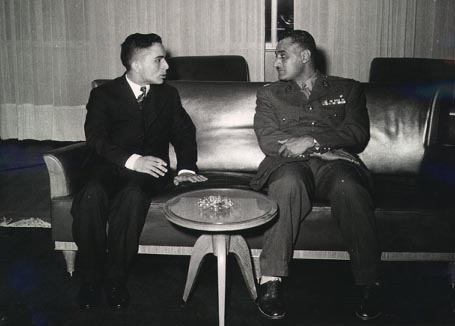 |
Keys
to the Kingdom National Anthem The Office History |
|
The 1950s were a period of tumultuous political upheaval throughout the Arab world. Much of this turbulence was attributed to popular dissatisfaction caused by the creation of the state of Israel and the loss of Palestine in 1948-49. Colonial powers also continued to exert their influence over the Arab nation, a condition which prompted seething resentment among the masses. Popular discontent led to a sharp growth in support for several radical pan-Arab ideologies. The Ba’th (Renaissance) Party originated in Syria in the late 1940s under the leadership of two Damascus schoolteachers, Michel Aflaq and Salah al-Bitar. It championed the immediate political unity of all Arab states under the slogan of “Unity, Freedom, and Socialism.” While gaining a degree of popular support throughout the Mashriq (eastern) region, it eventually gained power in Syria and Iraq through military coups. Feuding branches of this pan-Arabist party remain in power today in Syria and Iraq. One of the key players in the Arab political arena during the 1950s and 1960s was Egyptian President Gamal Abdel Nasser. Coming to power in 1954 after participating in the 1952 Free Officers’ coup which overthrew King Farouk, Nasser possessed charisma and oratory skills which enabled him to rally the Arab masses. Nasser’s brand of pan-Arabism, broadcast via radio throughout the Arab world, especially appealed to the displaced Palestinians. With his popularity boosted enormously after the Suez Crisis of 1956, when he successfully stood up against the combined front of Britain, France and Israel, Nasser appeared to be the new Salah Eddin who would unify the Arabs and reconquer Palestine. |
 |
||
| His
Majesty King Hussein meets with Egyptian President Gamal Abdel Nasser, mid-1950s. © Royal Hashemite Court Archives |
||
| The
vocabulary of pan-Arabism was always more appealing in the actions it lead to. Nasser, the
Ba’th and others continually tried to outbid each other for leadership of the
pan-Arab movement. Instead of fostering unity among Arabs, the rivalry fostered by the
radicals led to deep divisions between Arab states. Eventually in 1967 it led to another
crippling setback in the struggle against Zionism. While Nasser, the Ba’th and radical pan-Arabists frequently proposed unity agreements only to see them dissolve in mutual recrimination, King Hussein steadfastly pursued his own ideal of Arab nationalism. As he saw it, pan-Arabism could only succeed in promoting unity among the Arabs if it respected the special character of the different Arab countries and regimes, without trespassing on their individual national sovereignties. In the words of King Hussein:
King Hussein I, 1962
Essentially, the “unity” proposals of Nasser and the Ba’thists consisted of one state seeking to impose its domination over another. The short-lived United Arab Republic, consisting of Egypt and Syria, lasted from 1958-61 and demonstrated the shortcomings of the radical unity plans. While popular in the “street,” this risky approach maximized rivalry among Arab states at a time when unity of purpose was needed more than ever before. With time, King Hussein’s visionary pan-Arab statesmanship became evident, and the radicals were discredited in the eyes of the Arab people. Three days after his coronation in May 1953, King Hussein called upon newly-appointed Prime Minister Fowzi al-Mulqi to introduce a series of liberal reforms, including freedom of speech and freedom of the press. However, a sense of civic responsibility had not yet permeated the Jordanian populace as a whole. Radical groups exploited the reforms and relentlessly attacked the regime, thus undermining the stability and integrity of Jordan. Sometimes they even cynically initiated riots in order to provoke reprisals. Nasser’s propaganda broadcasts, in particular, incited massive riots which undermined domestic order. Throughout the course of his long and fruitful reign, King Hussein tried to govern according to the precepts and ideals of democratic liberalism, while at the same time maintaining the necessary prerequisite of public order. This balancing act was not always easy. For example, in 1956, completely free parliamentary elections were held, and radical groups including communists and Ba’thists dominated the new cabinet. In another important development, King Hussein dismissed the British commanders of the Arab Legion in 1956, and terminated the Anglo-Jordanian Treaty in March of 1957. However, he thought that his government’s leftward drift would eventually lead to a communist infiltration of the Arab world, and consequently he resisted the trend. A number of riots, and an externally-inspired coup attempt which was personally thwarted by King Hussein, forced him to impose martial law in the spring of 1957. These disruptions to Jordan’s stability were followed by a succession of internal upheavals which culminated in perhaps the most serious threat to King Hussein’s early reign—the crisis of July 1958. Five months after the formation of the Arab Federation, a federal union between Jordan and Iraq, a bloody military coup in Iraq by pro-Nasserist officers led by Colonel Abdel Karim Qassem shattered the Arab Federation and left Jordan isolated. With a deft hand characteristic of his leadership, King Hussein was able to haul Jordan out of this state of siege. While maintaining a firm grip on Jordan’s internal security, he reluctantly accepted British military help and an American oil airlift in order to preserve the state against its external enemies. |